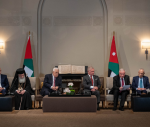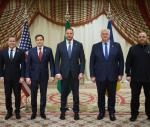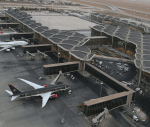You are here
Jordan says time factor crucial in countering IS
By JT - Sep 11,2014 - Last updated at Sep 11,2014

AMMAN — Jordan on Thursday warned stakeholders against wasting time to join ranks and eradicate the Islamic State (IS) terror organisation before the group has a firmer foothold in the areas under its control.
Speaking at a ministerial meeting hosted by Saudi Arabia in Jeddah, Foreign Minister Nasser Judeh on Thursday also called for a comprehensive approach to address the rising extremism and terror groups in the region, blaming that on “the absence of a comprehensive political process, alienation policies and political vacuum” factors that provided an incubating environment for terrorists within local communities in Syria and Iraq.
According to the Jordan News Agency, Petra, Judeh said the time factor is crucial as IS, which he did not specifically name, is not a potential threat but rather an immediate danger, especially since the group has the ability to “transform and develop into worse shapes”. He also cited the fact that IS is increasingly taking control of resources and facilities that provide it with financial income, in an apparent reference to the oil refineries and funds in banks seized by the organisation.
Along with Jordan, the foreign ministers of Gulf Cooperation Council countries, Egypt, Turkey, Lebanon and Iraq, in addition to US Secretary of State John Kerry participated in the meeting.
“We, in Jordan, share long borders with Syria and Iraq, and we look at this danger as a direct threat to our security. This requires that we join efforts to remove such a cancer before it is too late,” Judeh said, stressing that this danger poses a threat to the region and the entire world, and that no single country can handle the task alone.
Besides, no country has immunity against the growing danger of IS, Judeh added.
He said that this terrorist organisation managed to cross borders into Syria and Iraq, so any effective effort must comprise a comprehensive strategy that includes both countries.
He noted that the formation of a new Iraqi government is the first step towards enhancing Iraq’s “collective political frameworks and national unity for all the components of the Iraqi society”.
On Syria, the minister said relaunching the political process there requires redefining governing principles to ensure a transition that meets the aspirations of the Syrian people.
Full support
Reuters reported that the US signed up Arab allies on Thursday to a “coordinated military campaign” against IS fighters, a major step in building regional support for President Barack Obama’s plan to strike both sides of the Syrian-Iraqi frontier.
After talks in Saudi Arabia’s summer capital Jeddah, Kerry won backing from the 10 attending Arab countries — for a coalition to fight the Sunni militants that have seized swathes of Iraq and Syria.
The Arab states agreed in their communiqué to do more to stop the flow of funds and fighters to IS and help rebuild communities “brutalised” by the group.
“The participating states agreed to do their share in the comprehensive fight against ISIL, including... as appropriate, joining in the many aspects of a coordinated military campaign against ISIL,” they said, using the acronym for Islamic State of Iraq and the Levant, a former name for the group.
Kerry said the Arab states would play a critical role in the coalition, although he added that no country in the alliance was talking about sending ground troops.
He met the Arab leaders to drum up support a day after Obama announced his plans to strike fighters in Iraq and Syria. US officials said Kerry also sought permission to make more use of bases in the region and fly more warplanes overhead, issues that were not mentioned in the communiqué.
In a hopeful sign of outreach across the sectarian divide that has spread war across the Middle East and fed IS’ militancy, Sunni Saudi Arabia said it might open an embassy in Shiite-ruled Iraq after decades of suspicion.
The Saudis, who support other Sunni armed movements in Syria but consider IS a terrorist group, have also promised to help Obama’s campaign by providing training camps for moderate Syrian Sunni fighters.
But Iran, the main Shiite power in the Middle East and supporter of Syria’s President Bashar Assad, said it had severe reservations over the new US-led coalition, and doubted it would fight “the root causes of terrorism”, which it blames squarely on Sunni Arab states like Saudi Arabia.
Obama announced his plans in a prime-time address on Wednesday to build an alliance to root out IS in both Syria and Iraq, plunging the United States into two conflicts in which nearly every country in the Middle East has a stake.
Related Articles
Syrian rebels can help weaken jihadists fighting in Iraq, US Secretary of State John Kerry said Friday as Washington unveiled plans to boost Syria’s opposition with $500 million in arms and training.
Blunt talk over the US opening to Iran and reticence in Syria will be on the menu when President Barack Obama travels to Saudi Arabia next month to meet King Abdullah Bin Abdulaziz.
RIYADH — President Barack Obama said Thursday that the US and its Gulf partners should wait to see whether Iraq can resolve its political cr
















